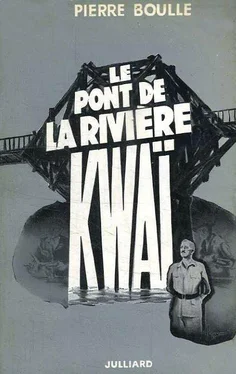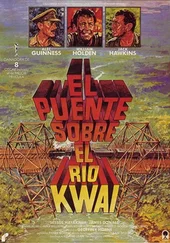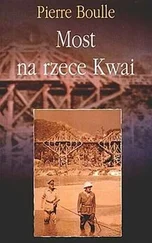Having worked himself into a paroxysm of rage by sundown, he decided to assert his authority and called everyone out on parade. He, too, had made up his mind to deliver a speech. From his opening words everyone realized that there were dark clouds gathering over the River Kwai.
“I hate the British…”
He had started off with this phrase, which he had then inserted between every other sentence as a sort of punctuation mark. He was fairly fluent in English, having at one time served as military attaché in a British possession, a post which he had been forced to give up because of his chronic drunkenness. His career had petered out into the ignominious position which he now held, a chain-gang warder without a hope of promotion. The hatred he felt for the prisoners was intensified by all the humiliation he had suffered from not having seen any action.
“I hate the British,” Colonel Saito declared. “You’re here, under my personal command, to carry out a job which is necessary for the victory of the Japanese Grand Army. I want to tell you, once and for all, that I won’t have my orders questioned in any way. I hate the British. Noncompliance will be punished severely. Discipline must be maintained. If any of you are thinking of putting up a show of resistance, let me remind you that I’ve got power of life and death over the lot of you. I shan’t think twice about exercising that power in order to bring the work with which His Imperial Majesty has entrusted me to a successful conclusion. I hate the British. The death of a few prisoners leaves me cold. The death of the whole lot of you is a mere trifle to a senior officer of the Japanese Grand Army.”
He had climbed onto a table, as General Yamashita had done. Like him, he had seen fit to don a pair of pale-gray gloves and polished riding boots, instead of the canvas shoes he had worn during the day. His sword, needless to say, hung from his hip, and he kept slapping the hilt, either to lend more weight to his words or to work himself up into the state of rage which he considered suitable to the occasion. He was a grotesque figure. His head wobbled on his shoulders like a puppet’s. He was roaring drunk, drunk on European alcohol, on the whisky and brandy left behind at Rangoon and Singapore.
As he listened to these nerve-racking words, Clipton remembered the advice he had once been given by a friend who had lived for some time with the Japanese. “Never forget, when you deal with them, that these people believe in their divine destiny as part of an unquestionable creed.” All the same, he thought, there was no race on earth that did not entertain more or less the same religious belief in itself. So he tried to find another reason for this display of self-satisfaction. To be quite honest, he had to admit that in Saito’s speech there were certain basic principles to which the whole world subscribed, East and West alike. In the course of it he was able to recognize and identify the various influences behind the words which spluttered on the lips of this Jap: racial pride, a mystic belief in authority, the dread of not being taken seriously, a strange sort of inferiority complex which gave him a jaundiced, suspicious outlook on life, as though he was in perpetual fear of being laughed at. Saito had lived abroad, j He must have seen how the British sometimes made fun of certain aspects of the Japanese character, and how comic the affectations of a humorless nation were in the eyes of one to whom humor was second nature. But his uncouth manner of speech and uncontrolled gestures could only be attributed to a legacy of brutish violence. Clipton had felt vaguely uneasy when he heard him talking about discipline, but at the sight of him jumping about like a jack-in-the-box he came to the happy conclusion that there was something to be said for the inhabitants of the Western Hemisphere: at least they could take their drink like gentlemen.
With their own men looking on, and with the guards crowding round in threatening attitudes so as to emphasize the commandant’s fury, the officers listened in silence. They clenched their fists and deliberately assumed expressions of impassive calm, following the example set by Colonel Nicholson, who had given instructions to meet any hostile demonstration with a show of quiet dignity.
After this preamble designed to stir their imaginations, Saito got down to brass tacks. He became quite calm, almost subdued, and for a moment they thought they were going to hear a little sense.
“Now listen, all of you. You know what sort of job it is that His Imperial Majesty has been good enough to allocate to you British prisoners. We’ve got to connect the captials of Siam and Burma so as to enable the Japanese convoys to get across the four hundred miles of jungle in between, and to provide a way through to Bengal for the army which has liberated those two countries from European oppression. Japan needs this railway to continue her victorious advance, to enable her to overrun India, and so bring this war to a rapid conclusion. So this work must be finished as quickly as possible: in six months. Those are His Imperial Majesty’s orders. It’s in your interests as well. When the war’s over, you’ll probably be able to go home under the protection of our army.”
Saito continued in an even calmer tone of voice, as though the alcohol in his blood had all evaporated.
“Now, do you want to know what your specific task is, you men who are in this camp under my command? I’ll tell you; that’s why I’ve called you out on parade. You’ll only have two short stretches of line to build, to link up with the other sections. But your particular responsibility will be the erection of a bridge across the River Kwai that you can see over there. That’s your main task and you ought to feel proud of it, for it’s the most important job on the whole line. It’s quite pleasant work, requiring skilled men and not just navvies. What’s more, you’ll have the honor of being ranked among the pioneers of the Southeast Asia Coprosperity Sphere.”
“Just the sort of pep talk a Westerner might have given,” was Clipton’s immediate reaction.
“The work, of course, will be under the technical direction of a qualified engineer, a Japanese engineer. For purposes of discipline, you will be under me and my subordinates. So there’ll be no shortage of administrative staff. For all these reasons, which I’ve been good enough to explain, I’ve given orders for the British officers to work side by side with their men. Things being what they are, I can’t have a lot of idle mouths to feed. I hope I shall not have to repeat this order. Otherwise…”
Saito relapsed without warning into his initial state of frenzy, and started raving like a madman.
“Otherwise I’ll have to use force. I hate the British. I’ll have you all shot, if necessary, rather than give food to slackers. Sickness will not be considered a reason for exemption. A sick man can always make an effort. Ill build that bridge over the prisoners’ dead bodies, if I have to. I hate the British. Work will begin at dawn tomorrow. You will parade here on the first blast of the whistle. The officers will fall in as well. They’ll form a separate squad on their own, and they’ll be expected to get through the same amount of work as the rest of you. Tools will be issued and the Japanese engineer will give you his instructions. That’s all I have to say this evening. But I’d like to remind you of General Yamashita’s motto: ‘Be happy in your work.’ Just bear that in mind.”
Saito left the platform and walked back to his headquarters with long, angry strides. The prisoners dismissed and returned to their lines, with the incoherent speech still ringing unpleasantly in their ears.
“He doesn’t seem to have understood, sir. It looks as if we’ll have to fall back on the Hague Convention after all,” said Clipton to Colonel Nicholson, who had remained silently wrapped in thought.
Читать дальше











